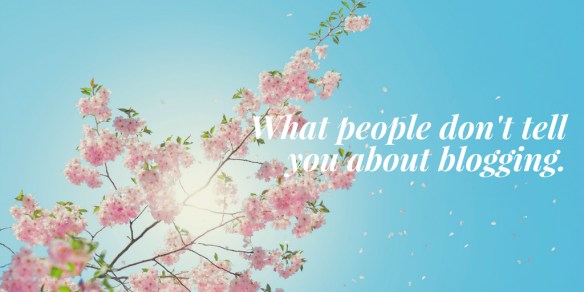
When you first start out writing, or want to be writing, or want to be publishing, or whatever it is you want to do to sell books, poems, short stories, non-fiction, people tell you to blog as part of your platform. And that’s all fine and good. Blogging is fun, you’ll build an audience, a fan base, and your content will sell like hotcakes because they like your free stuff.
But then the questions start popping up. Where do I set up my blog? What do I blog about? How many times do I have to blog, per week, per month, per year? Where do bloggers get those awesome graphics? Are they expensive, do you have to make them yourself? How much are the pictures?
In my last blog post, I wrote about my lack of time, and I said I would give up blogging to write. Blogging is writing, but I don’t see it being a huge moneymaker some blogs can be. I don’t do affiliate links, I don’t support advertising on my website. Partly because I’m not popular enough to make any money from it, and partly because I don’t want to be known for my blog. I want to be known for my books.
But if you haven’t blogged yet, or need some tips to get your blog on track, here are a few that I’ve picked up, and a few that I’ve read about. Maybe you can turn your blog into something amazing!
Figure out who you want to blog for.
I blog for indie writers. I blog about non-fiction books I’ve read and liked, editing tips, publishing tips, formatting tips, making-your-cover tips. If it has to do with indie-publishing and writing, I’ve probably at some point blogged about it. And so have countless others. While we’re humans with different experiences, thoughts, and feelings, you’ll be hard-pressed to find something in this area no one has written about yet.
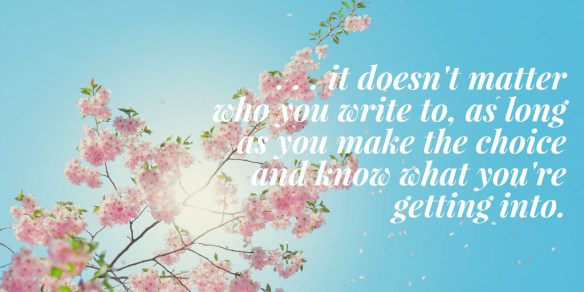
That said, I wish I would have started blogging for readers. I would have blogged for my fans, my people who love my books. The problem is, when I started blogging, I didn’t have a book out yet. Was that detrimental to writing for my readers? Not really. I mean, your readers will want to know where your ideas come from, maybe how long it takes you to write your book. They like the cover reveals. And maybe if you’re prolific, you have a lot to write about. The problem with blogging for your readers, however, is that all that you’re blogging about should go into your newsletter. There is only so much content to go around, you know? At any rate, it doesn’t matter who you write to, as long as you make the choice and know what you’re getting into.
Decide what you want to blog about.
I’ve read that when you blog, you need to choose 3-5 topics and write about only those. Always. Your readers follow your blog for a reason. If you write about publishing tips and news, then your readers want that. Not your thoughts on Trump, or the rogue blog post about how sick your kid is. While I’ve been accused of not being personal enough, do people really care that I had a crappy day and didn’t get my words in? Maybe if I can turn it into a post about productivity even when you’re not feeling well. But no one cares if I have a cold and I watched six episodes of Castle while I ate a gallon of ice cream. Begin as you wish to continue. If you want a lifestyle blog, then find an audience for that kind of a blog. I know for me, (and I know everyone will like different things) if you get to personal one too many times, I won’t read your blog anymore. Not when I follow your blog for tips on publishing, your own experiences, what you found out, if you stumbled upon any shortcuts. I started your blog because I was interested in that. I don’t have enough time in my schedule to care if you had to take your dog to the vet. Sounds harsh, but I don’t care. I read blogs to further my own career. Write your blog assuming that of your readers as well.
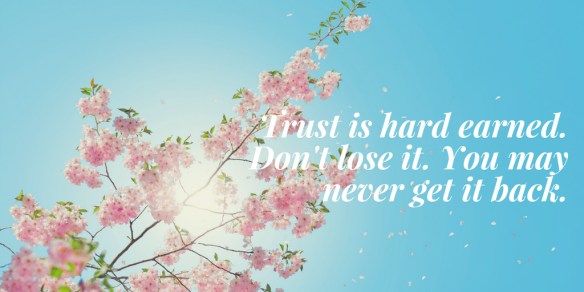
***A quick word about turning your blog into an indie book review site: if you decide to do this, and you decide to be honest in those reviews. Be prepared for backlash. Posting a negative review of a peer’s book is never a good idea, and rarely can you find an indie book where you will have nothing bad to say about it. A good rule of thumb would be to have a policy such as, if a book would have gotten less than three stars, then don’t review it. It’s a personal choice that can come with big repercussions if you upset one too many people. On the other hand, if you only give out 5-star reviews and you’re reviewing crappy books, your credibility will tank. Fast. Trust is hard earned. Don’t lose it. You may never get it back.
Find a spot.
I use WordPress because I like being part of the network. I don’t self-host, I let WordPress host my site because I don’t care about all the little extras you get with your website when you do that. I pay for my website address, and I pay for, I think, the business package so I can use some plugins. But if you don’t want WordPress, you can do Blogger, or Squarespace. My friend Aila did a great blog piece on Wix. WordPress was easy to set up, so I’ll recommend that. Plus the free templates WordPress make it easy to switch up your look when your site gets stale. As you add content (write books) it’s easy to add to your website. WordPress has been able to give me what I need, but it doesn’t matter where you blog. Just get an address and start producing content. Then tell everyone on social media about it.
Decide on consistency.
The reason your blogging is to get your name out there, build your writer’s platform, attach a person to your brand. The more you blog, and the more people who read you, the easier it is to find you. When you Google “Self-Publishing Help” Joanna Penn’s name comes close to, if not to the very, top. Eventually, you want to get up there. Self-publishing help, top fantasy writer, the most popular romance writer. Whatever people search for, you want to be close to the top. This can take years and years and years–I think Joanna’s been blogging since 2008. She has every right to be at the top. But you want to at least stand a chance of being found in a search. That means blogging good content, consistently. This is easier said than done. I’ve heard advice to blog as much as you can when you’re first starting out. Every day if possible. Then when you start to have a following, you can ease back. I try for twice a week, but lately, I’m lucky if I can do twice a month. Even if you blog four times a month, always post on the same day so your readers will get to know your schedule and know when to look for new content. Do I do this? No. Should I? Yes. Do my blogging friends do this? Yes.
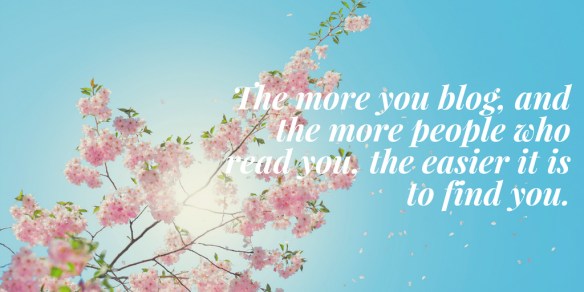
Where the hell do you get all those cute graphics?
Probably the best place for graphics is Canva. Canva is cool. Just choose the size of the graphic you want, slap some text on a photo and there you go. Awesome. Canva has some great photos free to use, and I also use Unsplash, Pexels, and Pixabay. You may not be using the photos for anything, but I still try to make sure the photos I use are free for commercial use. It just takes the headache out of it, you know? If you want to see how I used Canva to pretty up some blog posts, look at my interview with KT Daxon. I made those quote graphics in Canva using quotes from her book. Also, see my interview with Aila Stephens. I made those graphics with the cute pictures of macarons and looked up the quotes to slap on them. This leads me to my final point:
Figure out how long you want to spend doing this.
I can’t concentrate on anything for too long. I’ve been going back and forth between Facebook and Twitter. But being distracted didn’t do me any favors, and I’ve already put two (okay, three because I went to the kitchen for a snack) hours into this blog post. And I haven’t prettied it up with graphics yet. You need to, because studies have shown, (no, I’m not making this up, but I’m not going to dig for it for you, either) that people consume content better when it’s accompanied by photos. You want to break up long-ass paragraphs of text anyway, so might as well add some pretty stuff to it. A lot of my blog posts come off as book reports, or just reports, heavily researched and referenced. There’s not often I don’t add a few links to someone else’s blog post. That’s a boon for you because you add valuable content to your blog, and it’s great for the other blogs because you are driving traffic to their sites as well. The blogging community is much like the writing community. To get any traction, you have to read others’ blogs, comment, and share. Once you start to get going in that, you’ll have others do the same for you.
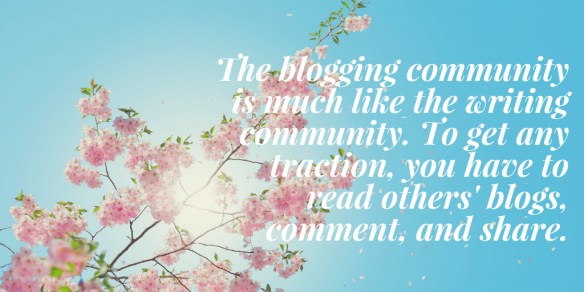
Blogging can be fun, but it can be a drain. It can be discouraging when you feel like no one is listening to you. I’ve been at this for a while, and I still don’t feel like I reach many people. If you only have so many hours in the day, you’re better off writing your books. Chances are good if you start a blog in hopes for a book deal, it’s not going to happen. Blog because you want to, because you want to help others, because you want to share your writing journey. Blog because you want to be included in the writing community.
I’m going to bed now.
Until next time!
Important Reasons Authors Need to Think About Blogging by guest @kikimojo
3 Reasons Why You Should Be Blogging
Why You Should Start a Blog (Even If You’re Not a Writer)
Discover more from Vania Margene Rheault
Subscribe to get the latest posts sent to your email.


I enjoyed your blog, so thank you for putting 3+ hours into it. I’ve just started blogging, although I’ve been a writer for decades. Now retired, I found that housework and paperback novels just wasn’t going to be the answer for me. I needed to exercise my writing muscle. Yes, blogging takes a lot of time, and in my situation, I’m fine with that, and I’m thoroughly enjoying the opportunity to write about things I’m interested (rather than what clients require). But its not as simple as all those “how to” bloggers might suggest. But now that I’m getting the hang of it, it’s an enjoyable part of my day.
LikeLiked by 1 person
Now I feel bad for saying that. ;P I just mentioned it because I wanted people to be aware that even just blogging off the top of your head can take a while. But thank you for reading and commenting. THIS is why I still blog. ❤
LikeLiked by 1 person
i love this post. worth reading. 🙂
LikeLiked by 1 person
Thank you! 🙂
LikeLiked by 1 person
Hmm, you gave me an idea…so your 3 hours weren’t a waste, LOL. I’ve linked others blogs to mine before, but I don’t do it as often as I should. Maybe I should change things up in that respect. Thank you for the tips!
LikeLiked by 1 person
Wow, thank you for this extensive information. It’s quite clear and I truly appreciate the effort put into the compilation. Now I have a quick go-to when it gets a little hazy in my blogosphere. 🤗
LikeLiked by 1 person
Thanks, Vickie. 🙂 Like I said, I’ve been told I don’t get personal enough, but I write to help other authors, not tell them about how cute my cat is. 🙂 There is only so much time in the day. Yours and mine. I’ll respect your time you can respect mine. 🙂 Have a great weekend!
LikeLike
Thank you so much. I am pretty new to this and basically your whole blog showed me I have no idea what I’m doing.
LikeLiked by 1 person
I’m sorry! I didn’t mean for that to happen. 😦 Just ask yourself who you want to blog for, and then keep topics and scheduling consistent (as consistent as you can) and you’ll see it pay off. Good luck, Robyn!
LikeLiked by 1 person
Pingback: Writing is a Bitter Business | Vania Margene Rheault
Normally I wouldn’t do this, but you’re such a good writer I thought you’d like to fix a little typo I saw. “… if you get to personal one too many times, I won’t read your blog anymore.” The first ‘to’ needs to be ‘too’ also. I used to be a freelance copyeditor and just had my first book published and yet was appalled to see ‘capitol’ instead of ‘capital’ when the ARC came out, despite numerous proofreading, arrrgghhh. Thanks for all the useful information.
LikeLiked by 1 person
Thank you! Sometimes a typo does go through every once in a while. I appreciate the heads up! I have an English degree and edit on the side, so I know how you feel. 🙂
LikeLike